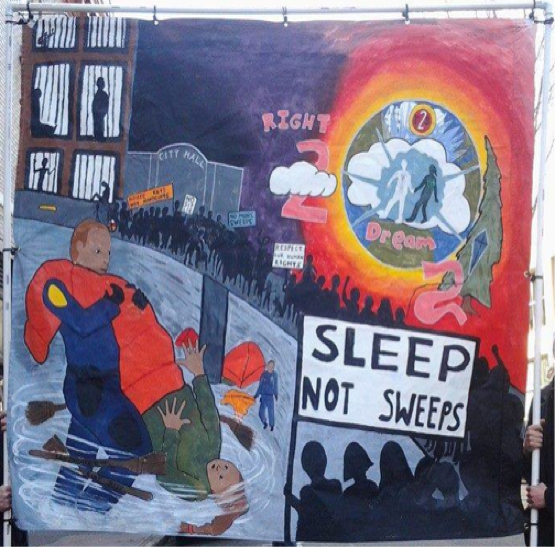About RESTING SAFE
RESTING SAFE investigates and intervenes in environmental injustice affecting unhoused community members.
People living unhoused are especially vulnerable to environmental hazards. Air pollution, soil toxins, rodents, floods, landslides, harsh winter weather, drought, mold and mildew, fire danger, and other dangers exacerbate the difficulties of surviving without stable housing. When people settle in polluted spaces -- often the only land not slated for development or planned green space or subject to intense policing -- people are exposed to dangerous conditions. Unhoused communities are frequently in a catch-22: speak up, and appeal to local public agencies to assist in remediating hazards, and risk eviction. Stay silent, and continue living in dangerous conditions.
A community-controlled solution is necessary, one that allows unhoused communities, themselves, to diagnose and reduce exposure to harm. A project of Right 2 Survive, RESTING SAFE brings together houseless community leaders and activist-researchers to investigate and intervene in environmental hazards in the places where houseless people are building homes and communities.
One important output of this project is a collectively created environmental justice-focused “RESTING SAFE Environmental Justice (EJ) Toolkit”. Our EJ Toolkit includes a series of pamphlets, posters, and other resources created by and for unhoused community members, designed to support DIY mitigation of hazards such as mold, fire, rodents, and air pollution. Undergirding this Toolkit tactic is an understanding that public agencies can rarely be counted on to intervene in the interests of houseless community members—whether day-to-day, during extreme weather events, or following disasters. A response that simultaneously addresses immediate threats to survival, at the same time as it builds political consciousness that informs collective action against sweeps and other forms of violence, is necessary.
RESTING SAFE taps into the deep expertise that houseless communities have already developed, pooling collective knowledge to enable people to learn from each other across cities and states. And it is contributing to Right 2 Survive and other groups’ efforts to build a national movement for House Keys Not Sweeps. Ultimately, this project aims to ensure that unhoused communities establish greater control over urban space, supporting efforts to abolish the carceral system and fight for more just land use, housing, and healthcare systems.
* We follow the lead of houseless-led activist organization Right 2 Survive in referring to people living without shelter as “houseless” (or “unhoused”) rather than homeless: home is where the heart is, the thinking goes, and just because someone lacks a home, does not mean they lack a heart.

